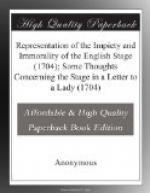These are things, Madam, of no trifling Importance; they are such as deserve the serious Reflections of all good Christians, whatever the Pretenders to Gaiety may think. And though some may, perhaps, misconstrue and ridicule such Considerations by the Names of Preciseness and Fanaticism; yet, ’tis to be hop’d, that all who have any regard for the Honour of God, the Welfare of their Countrey, and the Interest of our Established Church, will not be laugh’d out of their Duty, but be perswaded, not only to withdraw themselves from a Place of so much Danger, but advise others to do the like; that the Stage may no longer Triumph in the Spoils of Virtue and Religion. ’Tis now the time to begin such an Undertaking: We have a powerful Enemy abroad, and a more formidable one at home; I mean that Looseness and Irreligion which so abounds: and what will it avail us to subdue the one, while we encourage the other? The Hand of God has been lifted up against us, we have seen the Terrors of the Lord, and felt the Arrows of the Almighty; and what can all this mean, but to awaken us to a due Sense of our Danger? And, ’tis to be hop’d, the Nation has already taken the Alarm, and begin to think how to avert God’s Displeasure. The Stage is called in Question, and Papers are dispers’d to warn us of its Mischiefs; and it is not improbable that the Licentious and Unbounded Liberty the Players have taken of late years, and particularly in their daring to Act THE TEMPEST within a very few Days after the late dreadful Storm, has rais’d in the Minds of Men such an Abhorrence and Indignation, that we may possibly be so happy as to see the Stage (if not totally suppress’d) yet brought under such a Regulation, both as to the Plays that are Acted, and the Company that Resort to them, that Foreigners may no longer stand amaz’d when brought into our Theatres, nor Good Men tremble at the Continuance of them: but that Virtue may appear there with all its Charms, and Vice be expos’d to the utmost Contempt. In short, that the Stage may become so Chast, that even those Birds of Prey who now hover about the Play-Houses and make the Avenues to ’em so dangerous, may fly away from a Place that will no longer Encourage nor Protect them.
But after all, Madam, Whether this is such a Scheme as can ever be reduc’d in Practice; whether so noble a Structure as I am speaking of, can be erected upon so rotten a Foundation; whether the Wound is not Gangreen’d, and must be cur’d by Excision; I say, whether such a Regulation of the Stage be possible, must be left to those who have Skill and Authority to try the Experiment. In




